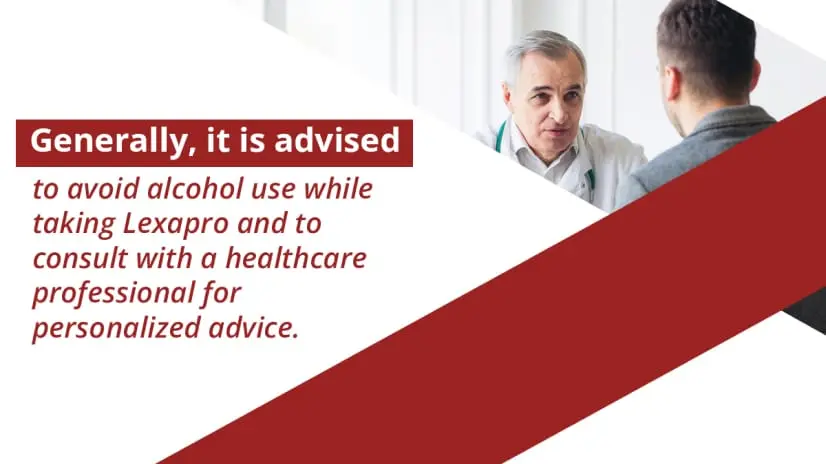
Can You Drink On Lexapro?
Clinically Reviewed by:
Many people wonder if it’s safe to drink alcohol while taking Lexapro, a common antidepressant. The short answer is that it’s generally not recommended.
While having an occasional drink may not cause significant harm for some people, it’s essential to consult with a doctor before mixing alcohol with Lexapro to avoid potential complications.
This article will explore these risks in more detail, helping individuals make safe choices regarding alcohol consumption while on Lexapro.

Key Takeaways
It is generally recommended to not mix prescription drugs with alcohol. Here’s what you need to know:
- Both alcohol and Lexapro are central nervous system depressants, which means they can slow down brain activity.
- Generally, it’s advised to avoid alcoholic drinks while taking Lexapro due to the risk of certain side effects.
- If you choose to drink alcohol while on Lexapro, do so in moderation and consult your healthcare provider.
Seek professional help for substance abuse and mental health conditions at Indiana Center for Recovery. Call (844) 650-0064 for details.
Lexapro
Lexapro is the brand name for escitalopram, which belongs to a class of drugs known as selective serotonin reuptake inhibitors (SSRIs). This medication is primarily used to treat major depressive disorder (MDD) and generalized anxiety disorder (GAD).
Lexapro functions by increasing the levels of serotonin, a neurotransmitter in the brain that is associated with mood regulation. By increasing serotonin levels, this prescription drug helps alleviate symptoms of depression and anxiety.
Additionally, Lexapro may also be prescribed for other conditions, such as panic disorder, obsessive-compulsive disorder (OCD), post-traumatic stress disorder (PTSD), and social anxiety disorder (SAD), depending on the healthcare provider’s assessment of the individual’s symptoms and needs.
However, it’s important to use Lexapro only as directed by a healthcare provider, as misuse, improper dosage, or combining it with other substances like alcohol can lead to adverse effects.
Alcohol And Lexapro
Drinking alcohol while taking Lexapro (escitalopram) is not generally advised. Both alcohol and Lexapro are central nervous system (CNS) depressants, meaning they slow down brain activity. Combining the two may increase the risk of certain side effects.
Moreover, alcohol can worsen symptoms of depression and anxiety, which are conditions Lexapro is often prescribed to treat. Drinking alcohol while on Lexapro may interfere with the effectiveness of the medication, making it less likely to provide relief from these symptoms.
Individual responses to alcohol and Lexapro can vary, so it’s vital to consult with a health professional before drinking while on this medicine. They can provide individualized advice based on your medical history and current health status.
In some cases, healthcare providers might recommend avoiding alcohol altogether while taking Lexapro to ensure optimal treatment outcomes and minimize potential health risks.
Possible Side Effects of Mixing Lexapro and Alcohol
Mixing Lexapro, an antidepressant medication, with alcohol can have various short-term and long-term side effects, ranging from mild to severe. Here’s an overview of potential side effects:
Short-Term Side Effects
Mixing Lexapro and alcohol can result in various short-term side effects:
- Increased Drowsiness: Both Lexapro and alcohol can cause drowsiness individually. When combined, their effects may potentiate, leading to excessive sleepiness or fatigue.
- Impaired Judgment and Coordination: Alcohol is known to impair cognitive function and coordination. When combined with Lexapro, these effects may be intensified, increasing the risk of accidents or injuries.
- Dizziness and Lightheadedness: Lexapro can cause dizziness as a common side effect. Alcohol can further exacerbate this sensation, leading to feelings of lightheadedness or vertigo.
- Increased Risk of Blackouts: Combining Lexapro with alcohol can heighten the risk of blackouts or memory lapses. This occurs due to the synergistic effects of both substances on the central nervous system.
- Mood Swings and Emotional Instability: Mixing Lexapro with alcohol can affect the medication’s ability to stabilize mood. This can result in unpredictable emotional reactions or exacerbation of depressive symptoms.
Long-Term Side Effects
Combining Lexapro with alcohol over the long term can have severe implications:
- Reduced Efficacy of Lexapro: Heavy alcohol consumption can interfere with the effectiveness of Lexapro and other antidepressants. This can lead to inadequate treatment of depression or anxiety symptoms.
- Increased Risk of Alcohol Dependence: Regularly combining Lexapro with alcohol may increase the likelihood of developing alcohol addiction. This is due to the reinforcing effects of alcohol on the brain’s reward system.
- Liver Damage: Both Lexapro and alcohol are metabolized in the liver. Long-term use of both substances can place additional strain on the liver, potentially leading to liver damage or dysfunction.
- Worsening Mental Health Symptoms: Chronic alcohol abuse can worsen symptoms of depression and anxiety over time. When combined with Lexapro, this effect may be amplified, making it more challenging to manage mental health conditions effectively.
- Increased Risk of Suicidal Ideation: Lexapro carries a black box warning regarding the increased risk of suicidal thoughts or behaviors, especially in young adults. Alcohol can further exacerbate these risks by impairing judgment and lowering inhibitions.
It’s important to speak with a healthcare professional before combining Lexapro with alcohol or making any changes to medication regimens. They can provide personalized guidance depending on individual health factors and help minimize potential risks.
Guidelines for Drinking While on Lexapro
Drinking alcohol while taking Lexapro should be approached with caution. Here are some general guidelines to consider:
Consult Your Healthcare Provider
Before consuming alcohol while on Lexapro, consult your healthcare provider or pharmacist. They can provide personalized advice based on your medical history, current medications, and individual factors.
Safe Drinking Limits
If your healthcare provider approves moderate alcohol consumption while taking Lexapro, adhere to safe drinking limits. Generally, moderate alcohol consumption is defined as up to one drink per day for women and up to two drinks per day for men. However, individual tolerances may vary.
Monitor Side Effects
Be vigilant for any adverse reactions or negative side effects when combining Lexapro with alcohol. These may include drowsiness, dizziness, impaired coordination, and a higher risk of mood swings or worsening depression.
Avoid Binge Drinking
Binge drinking, defined as consuming large amounts of alcohol in a short period, should be avoided while taking Lexapro. Binge drinking can profoundly increase the risk of adverse effects and interactions.
Consider Individual Tolerance
Individual tolerance to alcohol can vary widely. Factors such as age, weight, overall health, and genetics can influence how alcohol affects you while on Lexapro. Be mindful of your own tolerance level and adjust your alcohol consumption accordingly.
Monitor Your Mood
Alcohol is a depressant and can affect mood regulation. Some individuals may find that alcohol worsens their depressive symptoms or interferes with the effectiveness of Lexapro. Monitor your mood carefully and discuss any concerns with your healthcare professional.
Stay Hydrated
If you do choose to drink alcohol, make sure that you stay hydrated by drinking plenty of water. Dehydration can exacerbate the side effects of both alcohol and Lexapro.
Alternate Coping Mechanisms
Instead of relying on alcohol for relaxation or stress relief, consider alternative coping mechanisms such as exercise, mindfulness, or engaging in hobbies.
Plan Ahead
If you decide to drink alcohol on occasion while taking Lexapro, plan ahead and make responsible choices. Arrange for safe transportation if you’ll be drinking away from home, and avoid situations where the use of alcohol may be excessive or encouraged.
Remember that everyone’s situation is different, and what works for one person may not be suitable for another. Always prioritize your health and well-being, and never hesitate to seek advice from your healthcare provider regarding alcohol consumption while taking Lexapro.
Frequently Asked Questions (FAQ)
Mixing alcohol with Lexapro can increase drowsiness and dizziness and impair judgment. It may worsen depression and anxiety symptoms. It’s essential to avoid alcohol while taking Lexapro to prevent adverse reactions and ensure the medication’s effectiveness.
Generally, selective serotonin reuptake inhibitors (SSRIs) like sertraline and escitalopram have lower risks when consumed with alcohol. However, moderation is crucial, and it’s essential to consult a healthcare professional for personalized advice.
Yes, alcohol consumption can diminish the effectiveness of Lexapro in treating depression and anxiety. It may also exacerbate side effects and increase the risk of adverse reactions. It’s advisable to avoid alcohol while taking Lexapro for optimal therapeutic outcomes.






 100% Confidential
100% Confidential